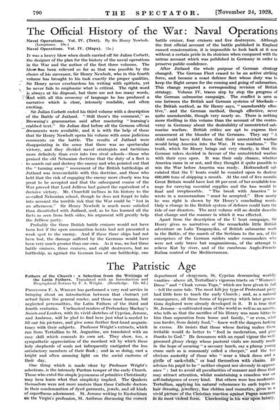The Official_ History of the War
•
-•
Naval Operations
Naval Operations. Vol. IV. (Text). By Sir Henry Newbolt. (Longmans. I6s.) Naval Operations. Vol. IV. (Maps). (5s.)
IT was a heavy blow when death carried off Sir Julian Corbett, the designer of the plan for the history of the naval operations in the War and the author of the first three volumes. The blow. as been relieved so far as that was possible by the choice of_his successor, Sir Henry Newbolt, who in this fourth volume has brought to his task exactly the proper qualities. Sir Henry never overburdens his writing with epithets, yet ti be never fails to erriPhasize what is critical. The right word ' is always at his disposal, but there are not too many words. t-lind with all this economy of language he has produced a narrative which is clear, - intensely readable, and often exciting.
. Sir Julian Corbett ended his third volume with a description of the Battle of Jutland. " Still there's the comment," as , Browning's grammarian said after mastering " learning's • crabbed text." Sir Julian died before all the German official
—documents were available, and it is with the -help of thek that Sir Henry Newbolt opens his volume with some judicious comments on the battle. The results of Jutland were disappointing in the sense that there was no spectacular victory, and they divided naval strategists and tacticians more definitely than ever into two rival schools—those who praised the old Nelsonian doctrine that the duty of a fleet is to search out and destroy the enemy and who pointed out that the " turning away " movement of the British battleships at Jutland was irreconcilable with this doctrine, and those who held that the risk of engaging the enemy more closely was too great to be accepted and that the subsequent course of the War proved that Lord Jellieoe had gained the equivalent of a decisive victory. Mr. Churchill inclines in his history to the so-called Nelsonian school, though he does not forget to take into account the terrible risk that the War could be " lost in an afternoon." Sir Henry Newbolt is much more satisfied than dissatisfied with Jutland, and, as he has learned all the facts as seen from both sides, his argument will greatly help the Jellicoe party.
Probably the three British battle cruisers would not have been lost if the open ammunition hoists had not presented a weak spot to the enemy. And if these three ships had not been lost, the damage suffered by the Germans would have been very much greater than our own. As it was, we lost three battle cruisers, three cruisers, and eight destroyers, but no battleship, as against the Gerthan loss of one battleship, one battle cruiser, four cruisers and five destroyers. Although the first official account 'of the battle published in England caused consternation, it is impossible to look back at it now without a certain pride in its stoicism when compared with the untrue account which was published in Germany in order to preserve public confidence.
After JUtland the whole purpose of German strategy changed. The German Fleet ceased to be an active striking force, and became a coast defence fleet whose duty was to keep the Bight secure for the coming and going of submarines. This change required a corresponding. revision of British strategy. Volume IV. traces step by step the progress of the Germtin submarine campaign. The .conflict is seen as One between the British and German systeins of blockade— the British method, as Sir Henry_ says, " unendurably effee- tiVe,"- and the Gerinan . method, though effective, never quite unendurable, though very nearly so._ There is nothing more thrilling in this volume than the account of the contro- Nersy in Germany about the desirability of unrestricted sub. marine Warfare. ' British Critics are apt to express. their amazement at the blunder of the Germans.. They_ say " A child could have told them that . their unrestricted warfare would bring America into the War. It was madness." The truth, which Sir. Henry. brings out very. clearly, is that the German rulers decided in favour of the unrestricted warfare with their eyes open. . It was their only, chance,: whether America came in or not, and they thought it _quite possible to win the War before America was ready. _Boltzendorff, cal- culated that the U boats could be counted upon to destroy 600,000 tons of shipping a month. At the end of five months Great Britain would have lost 39 per cent. of her available ton- nage for carrying essential supplies and the . kiss would be final and irreplaceable. " The break with America " he wrote in a memorandum " must be accepted." How -nearly he was right is shown by Sir Henry's concluding words. Only a change in the British system of defence could turn the tide of.our disasters. The next volume will no doubt describe that change and the manner in which it was effected.
Apart from the description of the U boat campaign, Sir Henry gives us narratives of the remarkable little British adventure on Lake Tanganyika, of British submarine work in the Baltic, of the march of the Serbians to the sea, of the enterprises of the German raiders under commanders who were not only brave but magnanimous, of the attempt to relieve Kut by river, and of the cumbrous Anglo-French- Italia& control of the Mediterranean. .


















































 Previous page
Previous page